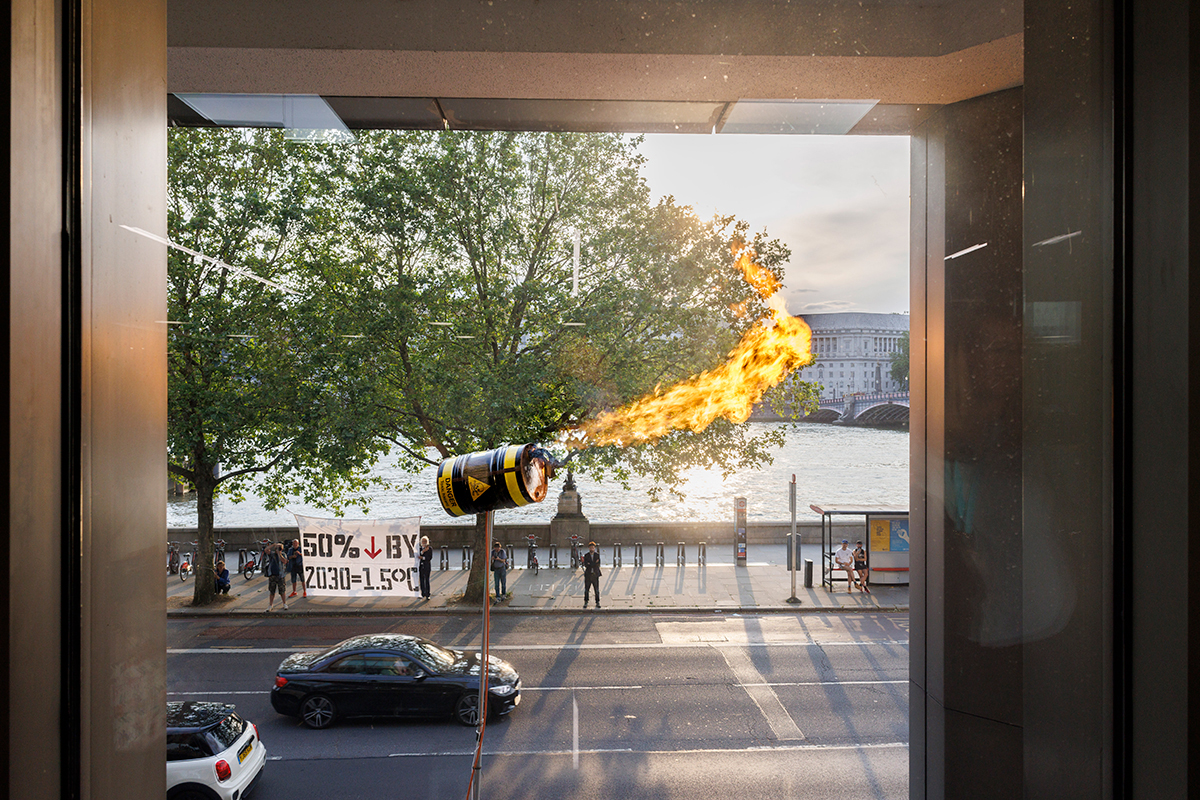IMO OMG, JUST DO IT
27.06.2023
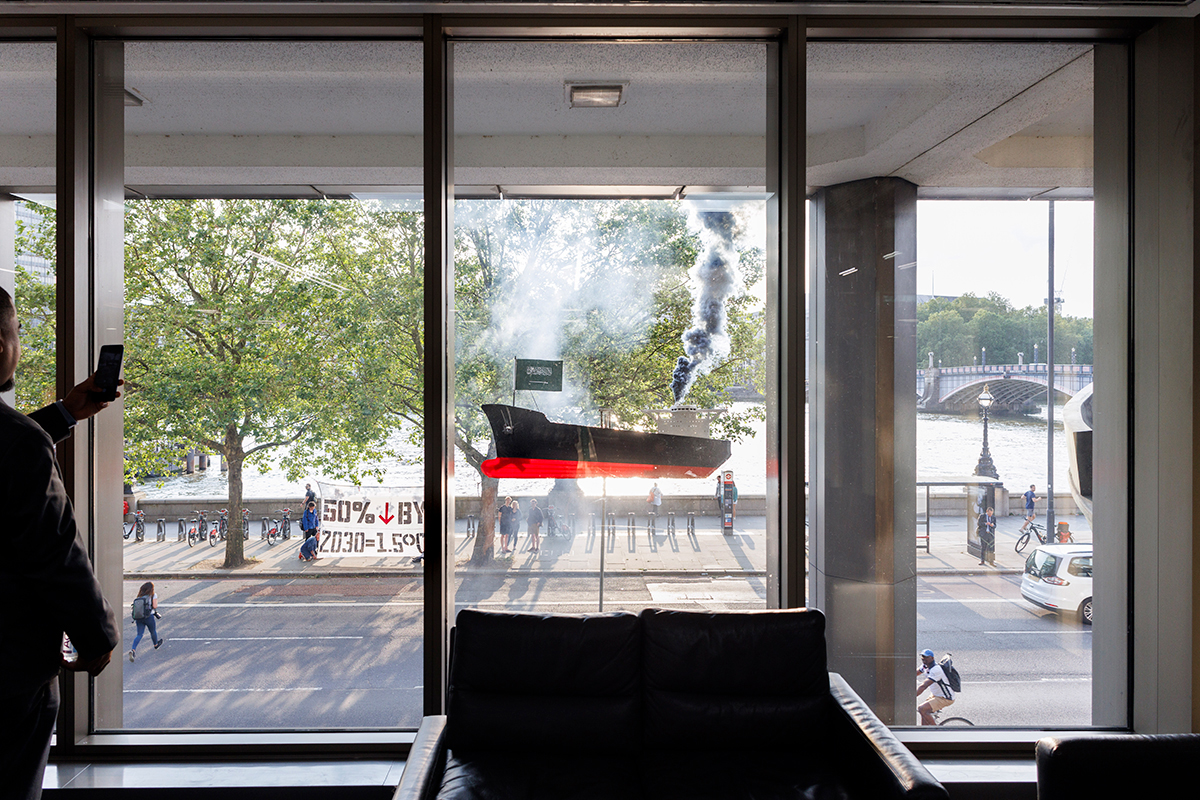
While UN International Maritime Organisation (IMO) delegates were sipping drinks, munching canapés and celebrating the first day of the Intersessional Working Group on Reduction of GHG Emissions from Ships meeting (ISWG-GHG15) – a meeting so catchily named that the full title still contains an acronym for Green House Gases – a large oil tanker appeared outside the first floor window of IMO HQ belching a vile black carbon fog of Heavy Fuel Oil (HFO).

The wanton black carbon pollution symbolises the pollution the IMO sponsors by neglecting its environmental remit. The puppet oil tanker successively flew the flags of Russia, Saudi Arabia and Argentina, the key Member States obstructing attempts to help save life on earth by halving shipping emissions by 2030, in line with the Paris Agreement targets.
The puppet oil tanker was operated by besuited members of Ocean Rebellion. Their puppeteering was a non-lethal imitation of the IMO delegates own puppeteering. Lobbyists from the Shipping and fossil fuel industries puppeteer every move the IMO makes. The IMO is a lethal puppet show which might cost the Earth.
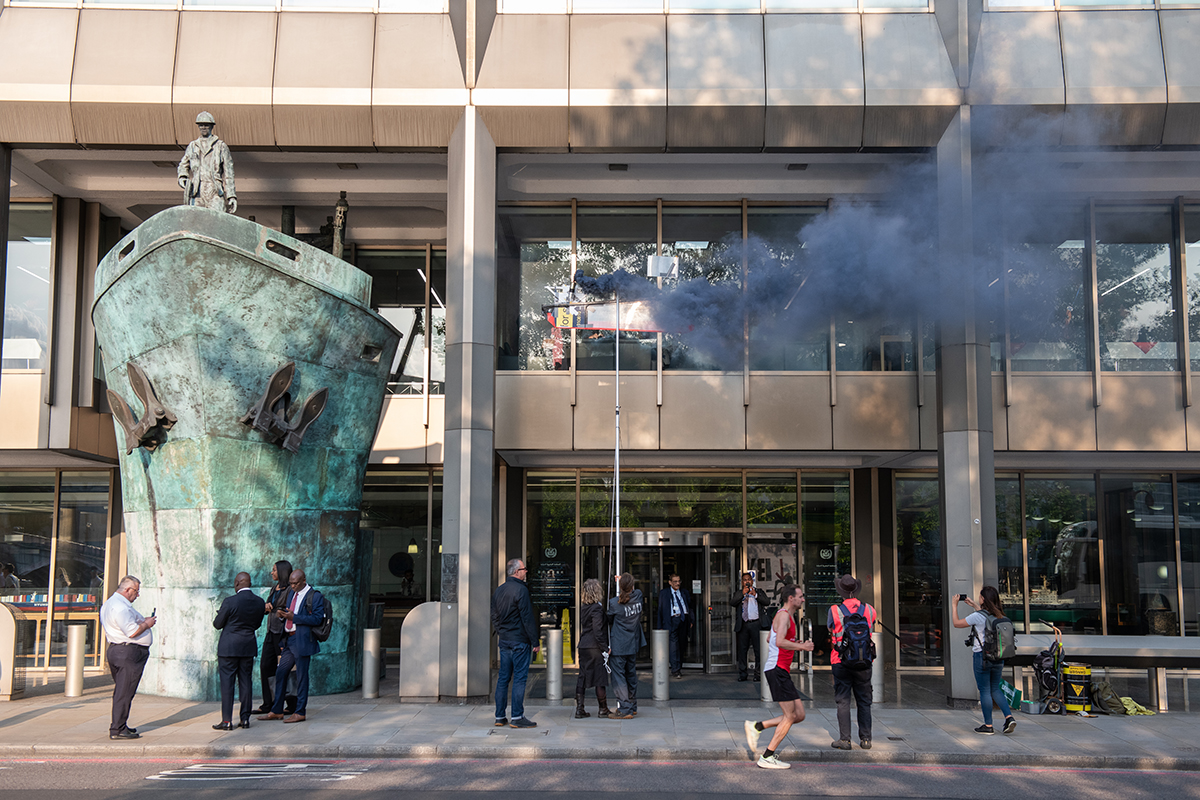
Minutes later the oil tanker had company. In another window a giant flaming Molotov oil drum appeared – a puppet carbon bomb representing the real carbon bomb the Member States of the IMO are placing under the future of humanity by ignoring shipping pollution. By refusing to tackle shipping pollution ahead of 2030 the IMO is destroying the Ocean and any chance we have of keeping anywhere near to the 1.5C demanded by the Paris Climate Agreement – an agreement brokered by the UN but one which one of its own bodies (UN IMO) can’t be bothered to implement.
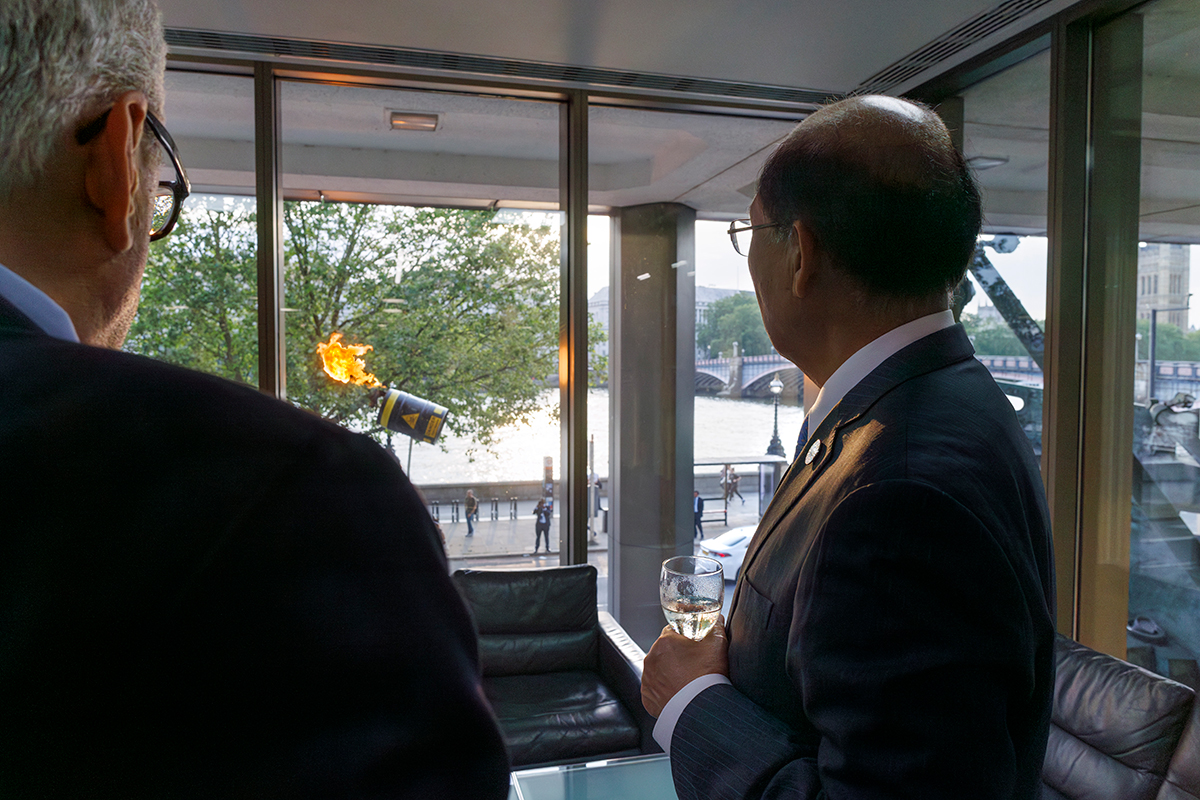
Secretary General of the UN IMO, Kitack Lim, sips a glass of fizz as he watches the Molotov oil drum pass by.
The Molotov oil drum and the oil tanker also tell the story of how the IMO still refuses to take simple actions like slow steaming, using cleaner distillates instead of HFO, stopping unnecessary shipping or creating a carbon shipping levy. The IMO and its Member States prefer listening to the oily advice of the fossil fuel lobbyists who insist on ‘business as usual’ and demand their oily byproduct HFO is burned at sea (it’s banned on land because it’s so toxic) or another of it’s noxious products LNG (Liquid Natural Gas – even more polluting because of Methane emissions).
As the tanker finished ejecting its vile HFO byproduct, across the street delegates could see figures unfurling a banner saying ‘50% down by 2030 = 1.5 degrees.’

Ocean Rebellion calls on IMO Member States to:
– Follow the science and commit to halve ship emissions by 2030
– Force ships to slow down to rapidly cut emissions
– Prioritise wind power for ships, new and old
– Speed up the roll-out of new climate-friendly fuels
– Steeply price the carbon in shipping fuels
– Scrap flags of convenience and offer a single standard of employment rights to all seafarers
– Make sure no-one is left behind by helping countries in need.
The IMO is allowing the fossil fuel industry to continue incinerating its waste product, HFO, at sea. HFO is a fossil fuel distillation byproduct that’s so toxic its use is banned on land – it’s highly acidic, full of nitrogen oxides (a major cause of respiratory diseases) and has been linked to 400,000 premature deaths worldwide per year (at a health cost of $50 billion).
The IMO is failing in its duty to meet the Paris Climate Agreement. It must act now to halve shipping emissions before 2030, advise against any fossil fuel subsidies and start severely taxing shipping fuel. All fossil fuel lobbyists must be ejected from committees and black-listed for their horrific influence on policy making, and all IMO processes must be made transparent and open to scrutiny.
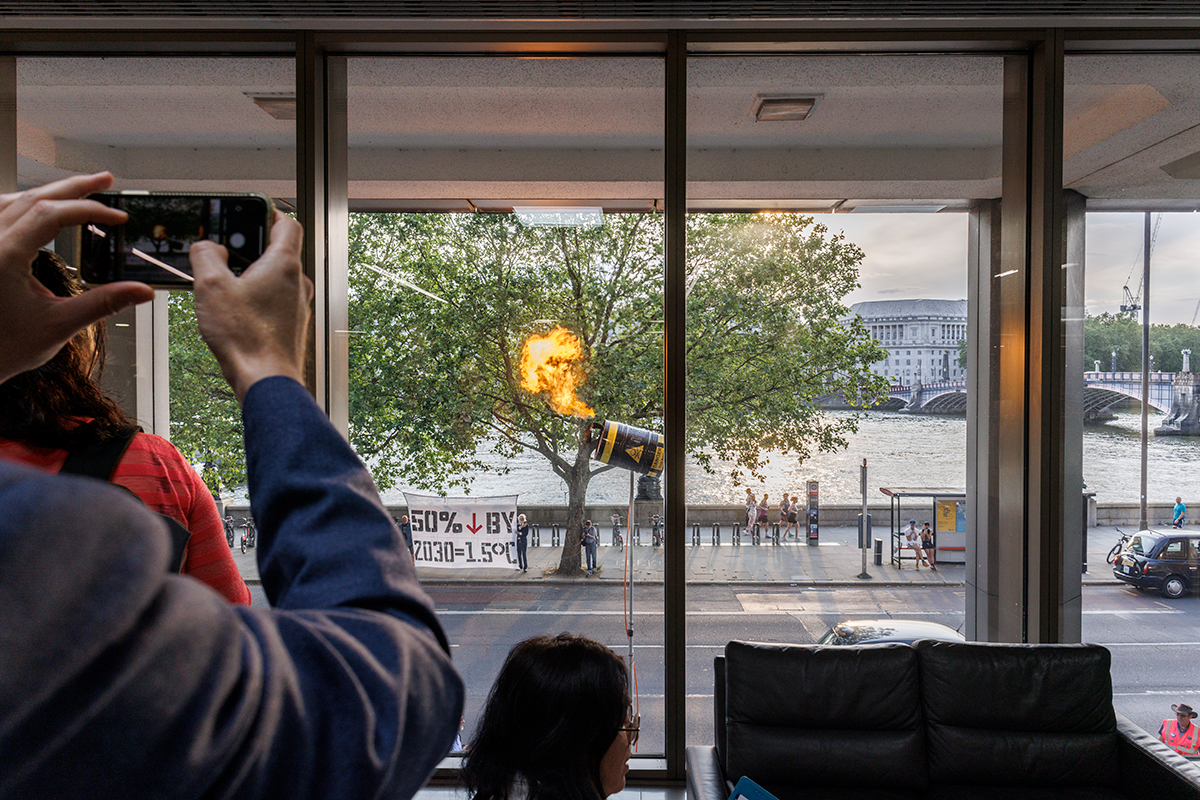
The fate of the Ocean depends on us all.
Our interventions depend on your support.
The IMO is currently revising its existing climate strategy. The IMO only aims to halve shipping emissions by 2050. Delegates are meeting in London to conclude its strategy revision for the Marine Environment Protection Committee (MEPC 80).
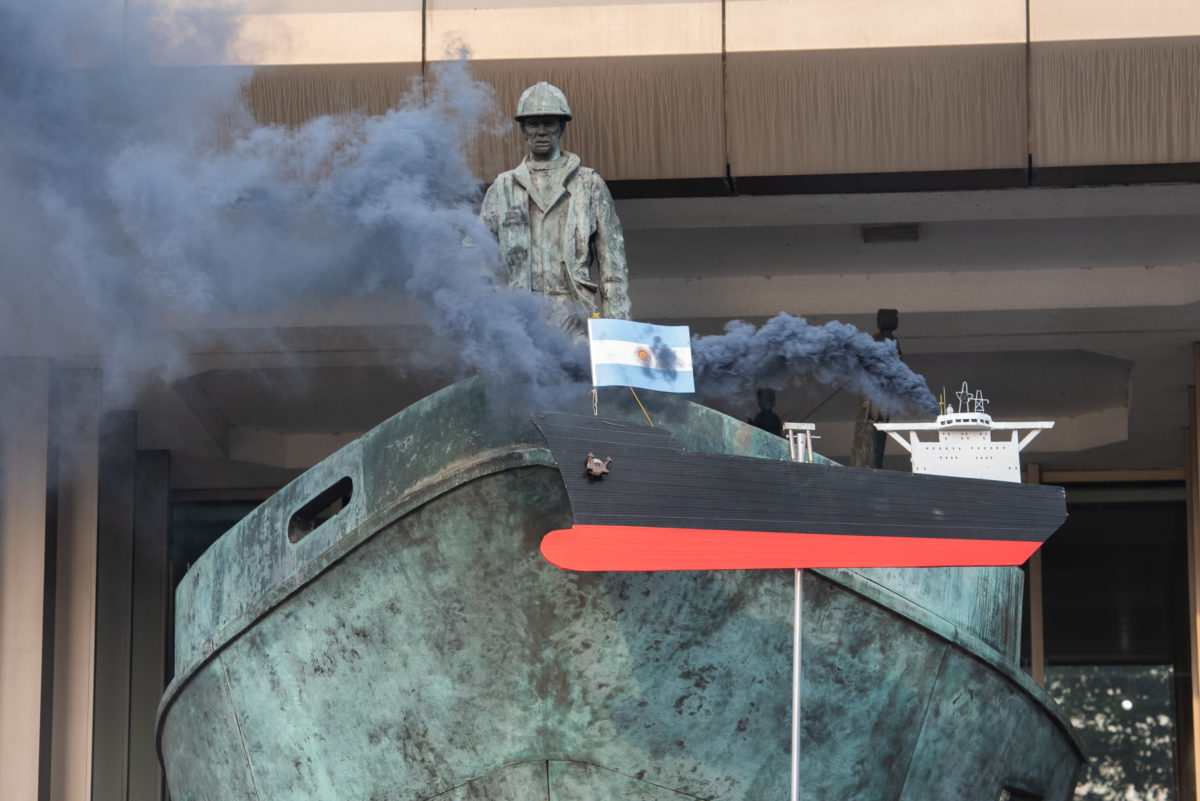
FACTS
HFO and the IMO
By allowing ships to burn HFO the IMO is significantly increasing shipping’s contribution to CO2 emissions rather than reducing them in line with the Paris Agreement. Furthermore black carbon from burnt HFO falls as soot and makes the ice caps absorb more heat and melt, further accelerating the terrifying feedback loops of planetary heating which are already killing millions and threaten all our lives.
Black carbon is especially dangerous when emitted by ships in the Arctic. IMO has been discussing rules for black carbon for more than a decade and the best they have to show for it is a commitment for a voluntary switch to cleaner fuels. The shipping industry has shown themselves incapable of self-regulation and are putting countless lives at risk. The time is now for a binding rule to tackle this potent source of climate heating.
Voluntary switching has never worked, when has any industry ever volunteered any meaningful commitment to the environment? The IMO must act to end HFO use now – not just in the Arctic but everywhere – if it is illegal to burn a fuel type on land then it should be illegal to burn it at sea. After all, much of it eventually ends up in the same place – our lungs.
Dirty Scrubbers
Not only is the IMO greenwashing fossil fuel use, it’s also proposing ‘scrubbers’ to do the same for ships. These scrubbers stop the worst HFO emissions entering the atmosphere: that’s good right? Well not if the scrubber turns it into an acidic solution and pumps it straight into the Ocean. So while still polluting the air the IMO is also now directly acidifying the sea – that’s surely the definition of greenwash! The IMO’s ‘solution’ is a toxic solution.
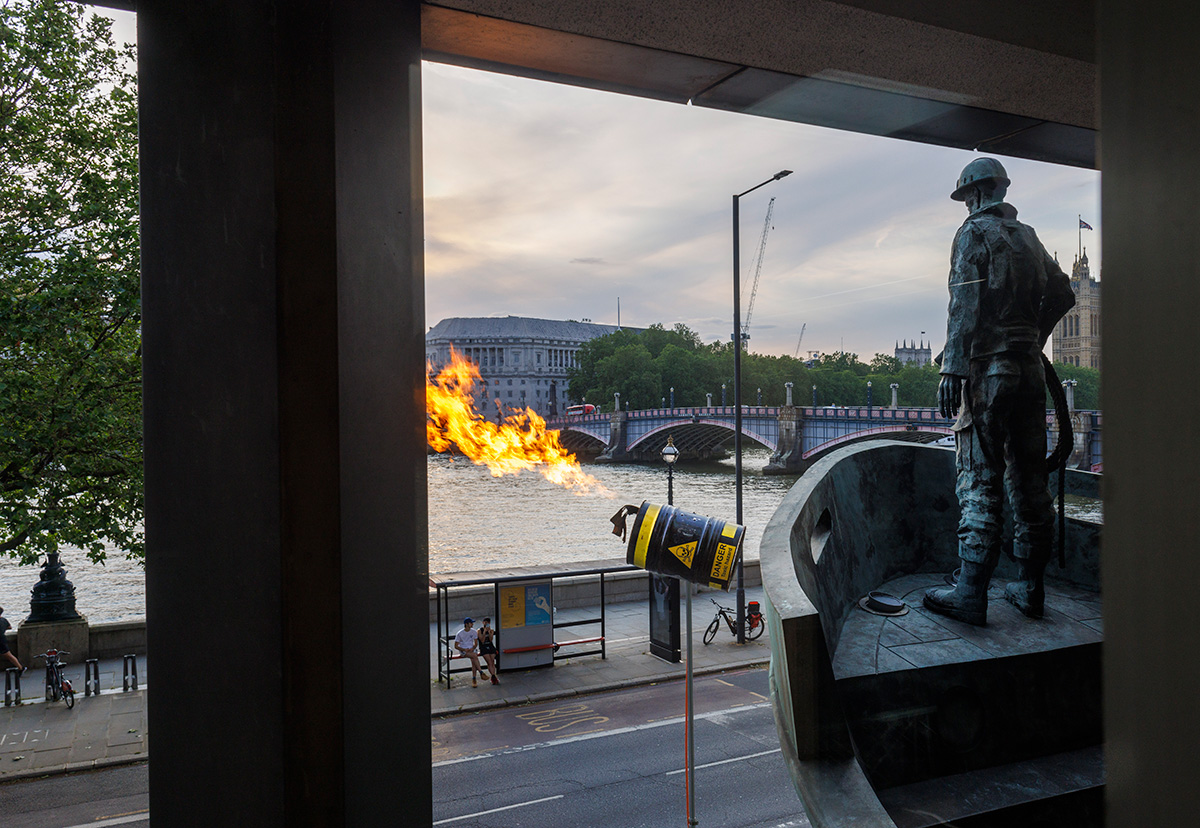
Liquid Natural Gas (LNG)
LNG is a fossil fuel that, when extracted, transported and burnt as a marine fuel, leaks methane into the atmosphere – a dangerous global-warming gas that is over 80-times more climate-warming in the short-term than carbon dioxide.
The UN’s Intergovernmental Panel on Climate Change (IPCC) identified rapid methane emission cuts as one of the top priorities in order to limit global warming to as close to 1.5°C as possible. The IPCC’s latest report focusing on climate mitigation makes clear that fossil gas in the form of LNG is not a solution for shipping’s decarbonisation.
Contrary to what climate science requires, shipping and port companies have been investing heavily in fossil LNG, alleging that the fuel will reduce their environmental impacts and climate pollution. There are currently over 785 new cargo ships on order globally, with over 400 being built to run on fossil LNG.
Burning more fossil LNG onboard vessels is a disaster in the making for our planet. It would only increase methane emissions from ships, which already rose by 150% between 2012 and 2018, according to the UN International Maritime Organisation (IMO).
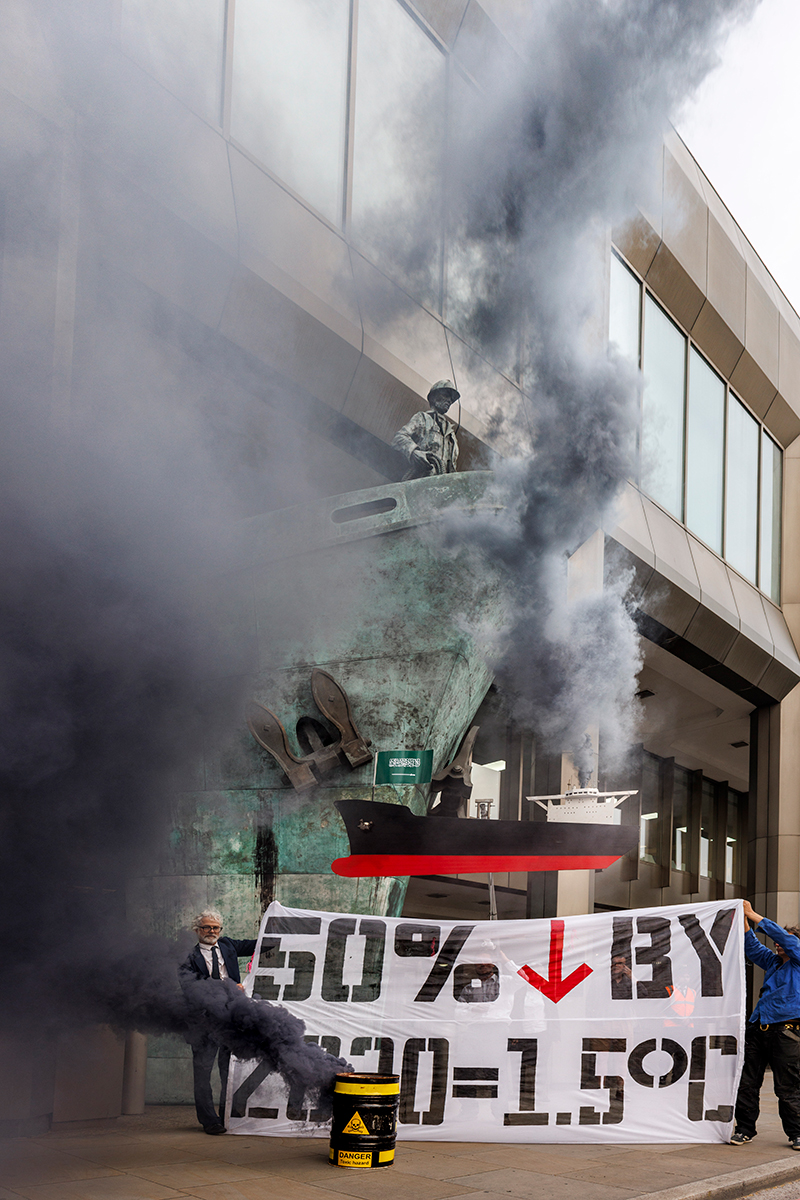
The IMO is unfit for purpose
The IMO is clearly unfit for purpose. It only acts on behalf of the shipping industry and rarely considers the environment. It must halve shipping emissions now, we are already too late for some people to survive the IMOs grisly policies, but not yet for everyone. Add to this the IMO’s continued backing of the fossil fuel industry, by not taxing shipping fuel and allowing the dirty fossil fuel byproduct HFO to be burned at sea, plus its lack of regulation of hazardous petrochemical shipping, and the list of IMO misdeeds and wrong directions begins to get very long indeed. Given this ever expanding list isn’t it time the environmental remit of the IMO is governed by another, better, UN agency? Life is too important to be squandered by inept bureaucracy.
Ocean Rebellion demands:
The UN must form a new, transparent, and representative body to govern the Ocean for the benefit of ALL life. This new body must have the restoration and replenishment of the Ocean as its only measure of success. It should replace corporate power with people power. And it should represent the many forms of marine life who actually make the ocean a home.
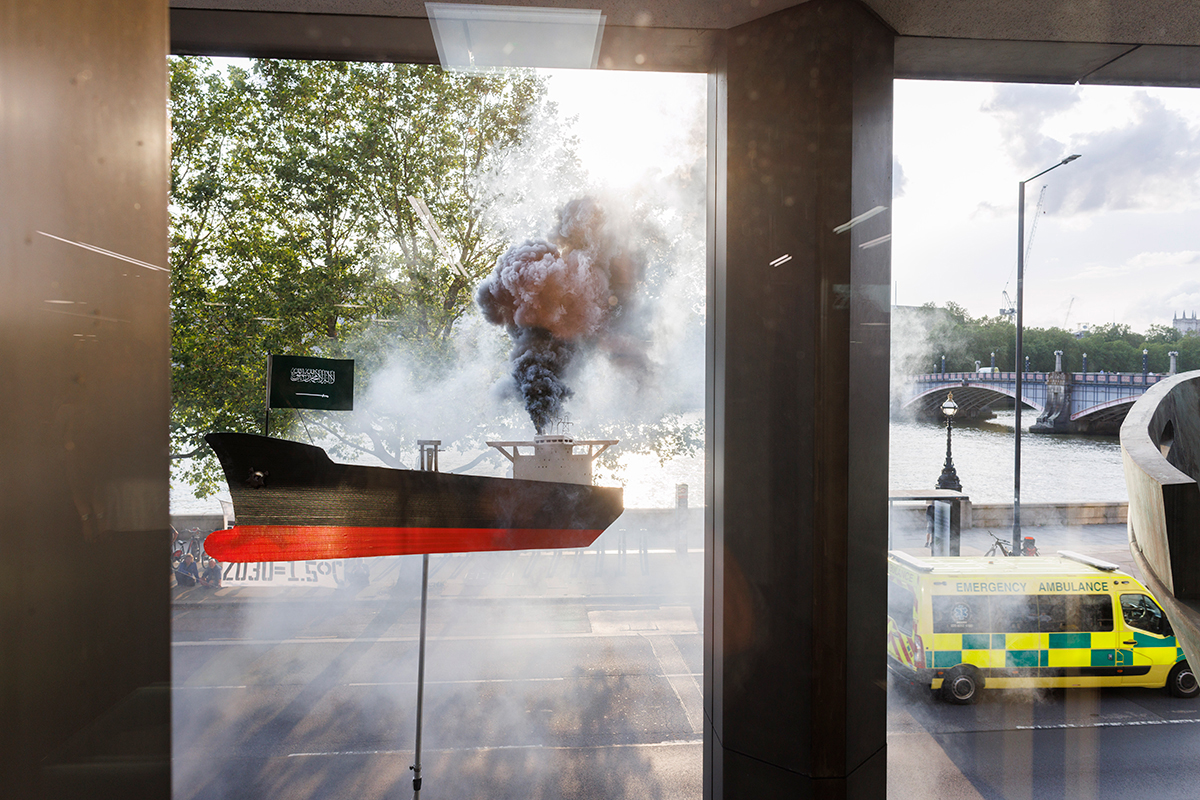
Chris Armstrong, University of Southampton says:
“By dodging obvious reforms like slow sailing, wind, and less international commerce the IMO condemns the Paris Climate Agreement to death by a thousand meetings. We must cut shipping emissions now. Commitments to Net Zero by 2050 cannot be used as a corporate ruse to avoid taking urgent action.”
Clive Russell from Ocean Rebellion says:
“This is an emergency. Our greenhouse gas emissions are setting off a chain of events tipping our environment and societies towards climate chaos. Every moment we fail to reduce our consumption of fossil fuels and commodities we threaten the resilience of nature. With every day we fail to act, we approach dangerous tipping points with cascading knock-on impacts. There’s no time to waste, we must act now.”
Andrew Darnton adds:
“It’s called Liquid Natural Gas or LNG. It’s a fossil fuel. The UN IPCC has warned us we need to reduce fossil fuel use – how does building infrastructure to use more fossil fuels help us? LNG is not a solution, it’s just madness. Governments must stop listening to industry and start listening to the scientists, they’re all saying the same thing – CUT FOSSIL FUELS.”
Sophie Miller adds
“Shipping emissions are raising atmospheric CO2, and the black carbon from heavy fuel oil (HFO) burned in shipping is accelerating melting of polar ice. HFO is a waste product of the oil industry, ships will run cleaner and better on distilled fuel. Ocean Rebellion calls for an immediate ban on HFO, right now.”
Rob Higgs adds
“Why not drastically reduce shipping emissions easily by slow sailing and retiring inefficient ships? Surely this is a minimal requirement, in the short term, to make the shipping industry consistent with Paris Agreement goals?
Roc Sandford adds:
“As the seas die we die. And the seas are dying. Let’s make shipping history—over 40% of shipping is just shunting unneeded fossil fuels around the world. Much of the rest is pointless. And the damage is only being accelerated by idiotic greenwash schemes like using ‘scrubbers.”
Suzanne Stallard adds:
“The UN talks a great talk. The International Maritime Organisation, a UN body, is unfit for purpose. It’s corrupted by industry and uses its UN remit on behalf of the shipping industry. We’re living in an age of ecological breakdown, the UN must recognise this by reforming IMO governance. We ask the UN to call out its rogue subsidiaries and its rogue Member States who are wilfully harming the Earth.”

Photos from the top: 1, 2, 4, 6, 8, 9, 10 and below, Crispin Hughes; 3, 7 and 11 Gareth Morris; 5 Matt Hulse.
